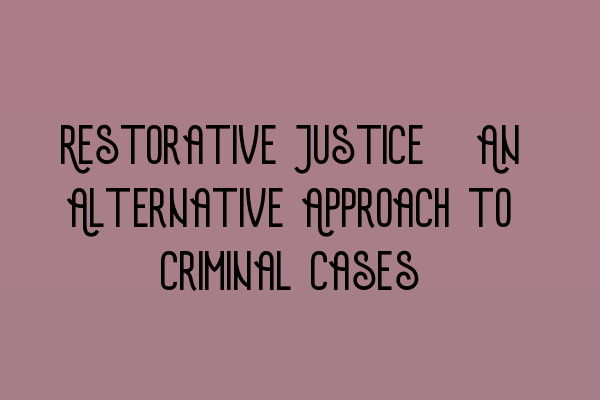Restorative Justice: An Alternative Approach to Criminal Cases
When it comes to dealing with criminal cases, the traditional approach has always been focused on punishment and deterrence. However, there is an alternative approach gaining recognition and support – restorative justice. Restorative justice aims to repair the harm caused by the crime and bring healing to all parties involved. In this blog post, we will explore the concept of restorative justice and its benefits in criminal cases.
What is Restorative Justice?
Restorative justice is a victim-centered approach that focuses on addressing the harm caused by the crime rather than solely punishing the offender. It brings together the victim, offender, and community to actively participate in the resolution process. By providing opportunities for open communication, understanding, and accountability, restorative justice seeks to find ways to repair the harm, promote rehabilitation, and prevent future offenses.
One of the key components of restorative justice is the emphasis on dialogue. Instead of the traditional adversarial court process, restorative justice encourages the parties involved to engage in thoughtful discussions, express their feelings, and take responsibility for their actions. This process allows the victim to be heard, offers the offender a chance for personal growth and reflection, and allows the community to play a role in the healing and reconciliation process.
Benefits of Restorative Justice
Restorative justice offers several benefits over the traditional punitive approach. Firstly, it provides an opportunity for the victim to have their voice heard and actively participate in the resolution process. This can bring a sense of empowerment, closure, and healing to the victim, as they are directly involved in making decisions about the outcomes of the case.
Secondly, restorative justice focuses on the rehabilitation of the offender. By working through the harm caused and understanding the impact on the victim, offenders can develop empathy and take responsibility for their actions. This can lead to greater accountability and decrease the likelihood of reoffending.
Furthermore, restorative justice fosters community involvement and engagement. By giving the community a role in the justice process, it strengthens social bonds, builds trust, and encourages a collective responsibility for preventing crime. Community support also plays a crucial role in helping victims and offenders reintegrate into society.
Implementing Restorative Justice
Implementing restorative justice requires a shift in the criminal justice system’s mindset and the adoption of alternative dispute resolution methods. Training programs, resources, and legislative support are essential in promoting the use of restorative justice in criminal cases.
Organizations like SQE Criminal Law & Practice are at the forefront of providing comprehensive training courses and support for legal professionals interested in incorporating restorative justice practices into their work. By equipping solicitors and lawyers with the necessary skills and knowledge, the adoption of restorative justice can be more widespread.
Additionally, the implementation of restorative justice can be facilitated through collaborative efforts between legal professionals, community organizations, and justice system stakeholders. Working together, they can develop protocols, guidelines, and referral networks that prioritize the use of restorative justice in appropriate cases.
The Future of Restorative Justice
As more people recognize the limitations of the traditional punitive approach, restorative justice is gaining momentum as a viable alternative. Its focus on healing, accountability, and prevention aligns with the modern understanding of justice. Restorative justice has also been shown to reduce reoffending rates and improve victim satisfaction.
Looking ahead, it is crucial for legal professionals, policymakers, and communities to embrace restorative justice as an integral part of the criminal justice system. By investing in training, resources, and research, we can further develop restorative justice practices and ensure a fairer and more effective approach to resolving criminal cases.
Discover how SQE 1 Practice Mocks FLK1 FLK2 can help you prepare for the SQE exams and gain a deeper understanding of criminal law concepts.
Get ready for the SRA SQE exams with SQE 2 Preparation Courses that cover all the essential knowledge and skills required for a successful career in criminal law practice.
Conclusion
Restorative justice offers a promising and progressive alternative approach to criminal cases. By prioritizing healing, rehabilitation, and community engagement, it aims to bring about meaningful resolutions and prevent future crimes. Legal professionals should consider integrating restorative justice practices and support initiatives that promote its widespread adoption. Through collective effort and commitment, we can create a more just and compassionate criminal justice system.
Learn more about the SRA SQE Exam Dates and start preparing for a successful legal career.
